Entrepreneurship Report: Different Types of Entrepreneurial Ventures
VerifiedAdded on 2020/12/28
|15
|4333
|125
Report
AI Summary
This report delves into the multifaceted world of entrepreneurship, exploring various venture types such as small businesses, scalable startups, large company ventures, and social enterprises. It provides a comparative analysis of these ventures, highlighting their similarities, differences, and financial goals. The report further examines the impact of micro and small businesses on the economy, supported by statistical data, and assesses their contributions to the social economy, particularly in the context of Brexit. Additionally, it identifies key characteristics, traits, and skills of successful entrepreneurs, and discusses the influence of background and experience on entrepreneurial endeavors. The report concludes with a comprehensive overview of the entrepreneurial landscape, providing valuable insights into the dynamics of business development and management.

ENTREPRENEURSHIP
Paraphrase This Document
Need a fresh take? Get an instant paraphrase of this document with our AI Paraphraser
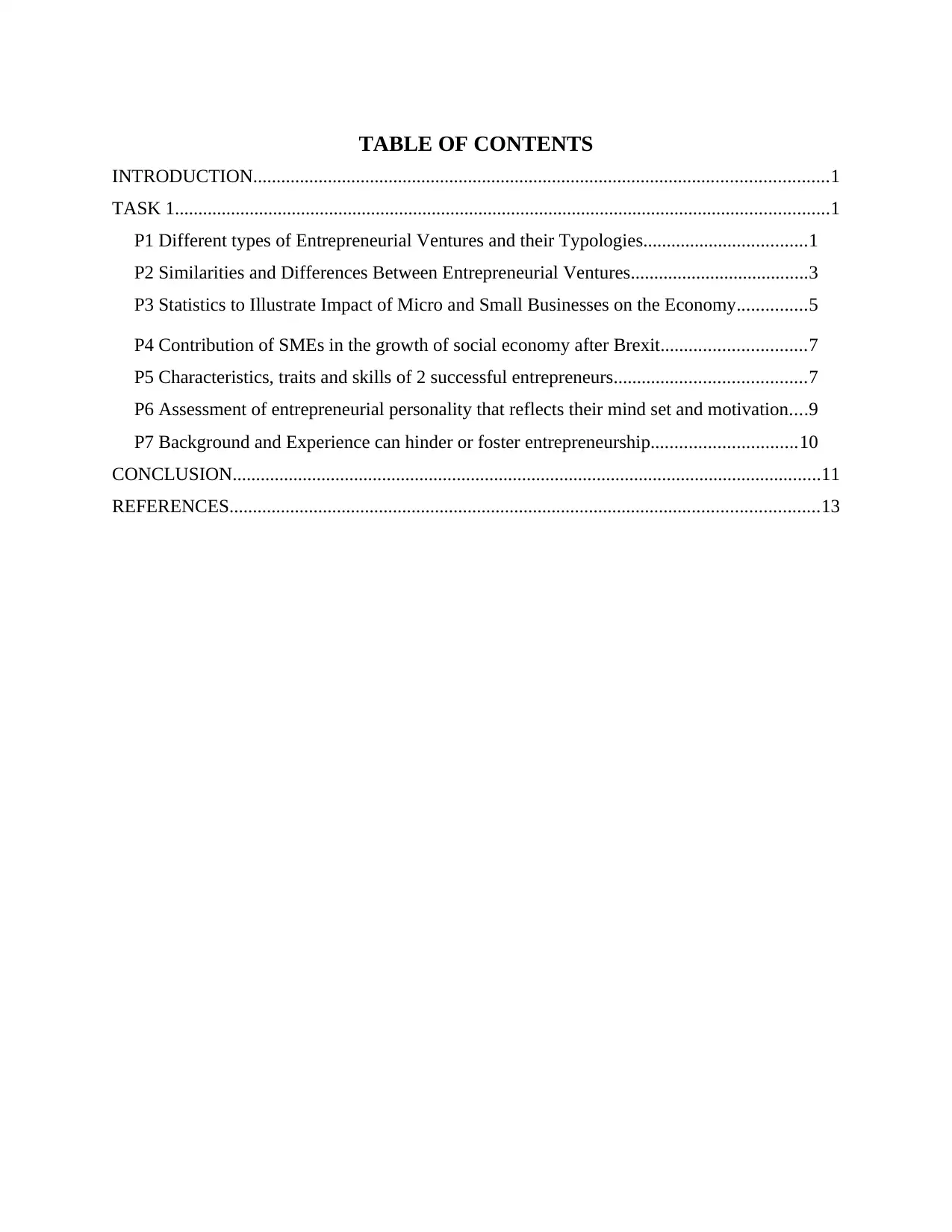
TABLE OF CONTENTS
INTRODUCTION...........................................................................................................................1
TASK 1............................................................................................................................................1
P1 Different types of Entrepreneurial Ventures and their Typologies...................................1
P2 Similarities and Differences Between Entrepreneurial Ventures......................................3
P3 Statistics to Illustrate Impact of Micro and Small Businesses on the Economy...............5
P4 Contribution of SMEs in the growth of social economy after Brexit...............................7
P5 Characteristics, traits and skills of 2 successful entrepreneurs.........................................7
P6 Assessment of entrepreneurial personality that reflects their mind set and motivation....9
P7 Background and Experience can hinder or foster entrepreneurship...............................10
CONCLUSION..............................................................................................................................11
REFERENCES..............................................................................................................................13
INTRODUCTION...........................................................................................................................1
TASK 1............................................................................................................................................1
P1 Different types of Entrepreneurial Ventures and their Typologies...................................1
P2 Similarities and Differences Between Entrepreneurial Ventures......................................3
P3 Statistics to Illustrate Impact of Micro and Small Businesses on the Economy...............5
P4 Contribution of SMEs in the growth of social economy after Brexit...............................7
P5 Characteristics, traits and skills of 2 successful entrepreneurs.........................................7
P6 Assessment of entrepreneurial personality that reflects their mind set and motivation....9
P7 Background and Experience can hinder or foster entrepreneurship...............................10
CONCLUSION..............................................................................................................................11
REFERENCES..............................................................................................................................13
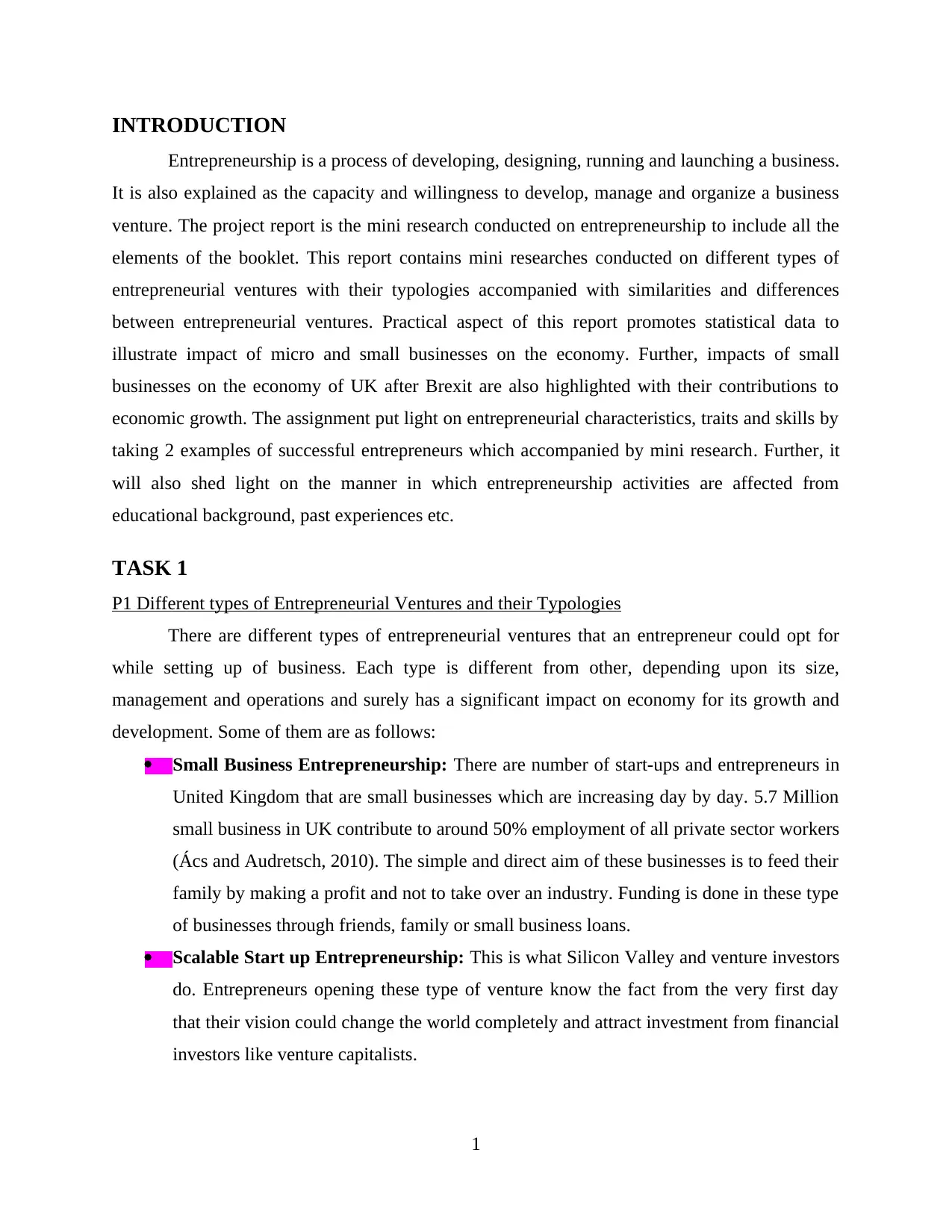
INTRODUCTION
Entrepreneurship is a process of developing, designing, running and launching a business.
It is also explained as the capacity and willingness to develop, manage and organize a business
venture. The project report is the mini research conducted on entrepreneurship to include all the
elements of the booklet. This report contains mini researches conducted on different types of
entrepreneurial ventures with their typologies accompanied with similarities and differences
between entrepreneurial ventures. Practical aspect of this report promotes statistical data to
illustrate impact of micro and small businesses on the economy. Further, impacts of small
businesses on the economy of UK after Brexit are also highlighted with their contributions to
economic growth. The assignment put light on entrepreneurial characteristics, traits and skills by
taking 2 examples of successful entrepreneurs which accompanied by mini research. Further, it
will also shed light on the manner in which entrepreneurship activities are affected from
educational background, past experiences etc.
TASK 1
P1 Different types of Entrepreneurial Ventures and their Typologies
There are different types of entrepreneurial ventures that an entrepreneur could opt for
while setting up of business. Each type is different from other, depending upon its size,
management and operations and surely has a significant impact on economy for its growth and
development. Some of them are as follows:
Small Business Entrepreneurship: There are number of start-ups and entrepreneurs in
United Kingdom that are small businesses which are increasing day by day. 5.7 Million
small business in UK contribute to around 50% employment of all private sector workers
(Ács and Audretsch, 2010). The simple and direct aim of these businesses is to feed their
family by making a profit and not to take over an industry. Funding is done in these type
of businesses through friends, family or small business loans.
Scalable Start up Entrepreneurship: This is what Silicon Valley and venture investors
do. Entrepreneurs opening these type of venture know the fact from the very first day
that their vision could change the world completely and attract investment from financial
investors like venture capitalists.
1
Entrepreneurship is a process of developing, designing, running and launching a business.
It is also explained as the capacity and willingness to develop, manage and organize a business
venture. The project report is the mini research conducted on entrepreneurship to include all the
elements of the booklet. This report contains mini researches conducted on different types of
entrepreneurial ventures with their typologies accompanied with similarities and differences
between entrepreneurial ventures. Practical aspect of this report promotes statistical data to
illustrate impact of micro and small businesses on the economy. Further, impacts of small
businesses on the economy of UK after Brexit are also highlighted with their contributions to
economic growth. The assignment put light on entrepreneurial characteristics, traits and skills by
taking 2 examples of successful entrepreneurs which accompanied by mini research. Further, it
will also shed light on the manner in which entrepreneurship activities are affected from
educational background, past experiences etc.
TASK 1
P1 Different types of Entrepreneurial Ventures and their Typologies
There are different types of entrepreneurial ventures that an entrepreneur could opt for
while setting up of business. Each type is different from other, depending upon its size,
management and operations and surely has a significant impact on economy for its growth and
development. Some of them are as follows:
Small Business Entrepreneurship: There are number of start-ups and entrepreneurs in
United Kingdom that are small businesses which are increasing day by day. 5.7 Million
small business in UK contribute to around 50% employment of all private sector workers
(Ács and Audretsch, 2010). The simple and direct aim of these businesses is to feed their
family by making a profit and not to take over an industry. Funding is done in these type
of businesses through friends, family or small business loans.
Scalable Start up Entrepreneurship: This is what Silicon Valley and venture investors
do. Entrepreneurs opening these type of venture know the fact from the very first day
that their vision could change the world completely and attract investment from financial
investors like venture capitalists.
1
⊘ This is a preview!⊘
Do you want full access?
Subscribe today to unlock all pages.

Trusted by 1+ million students worldwide
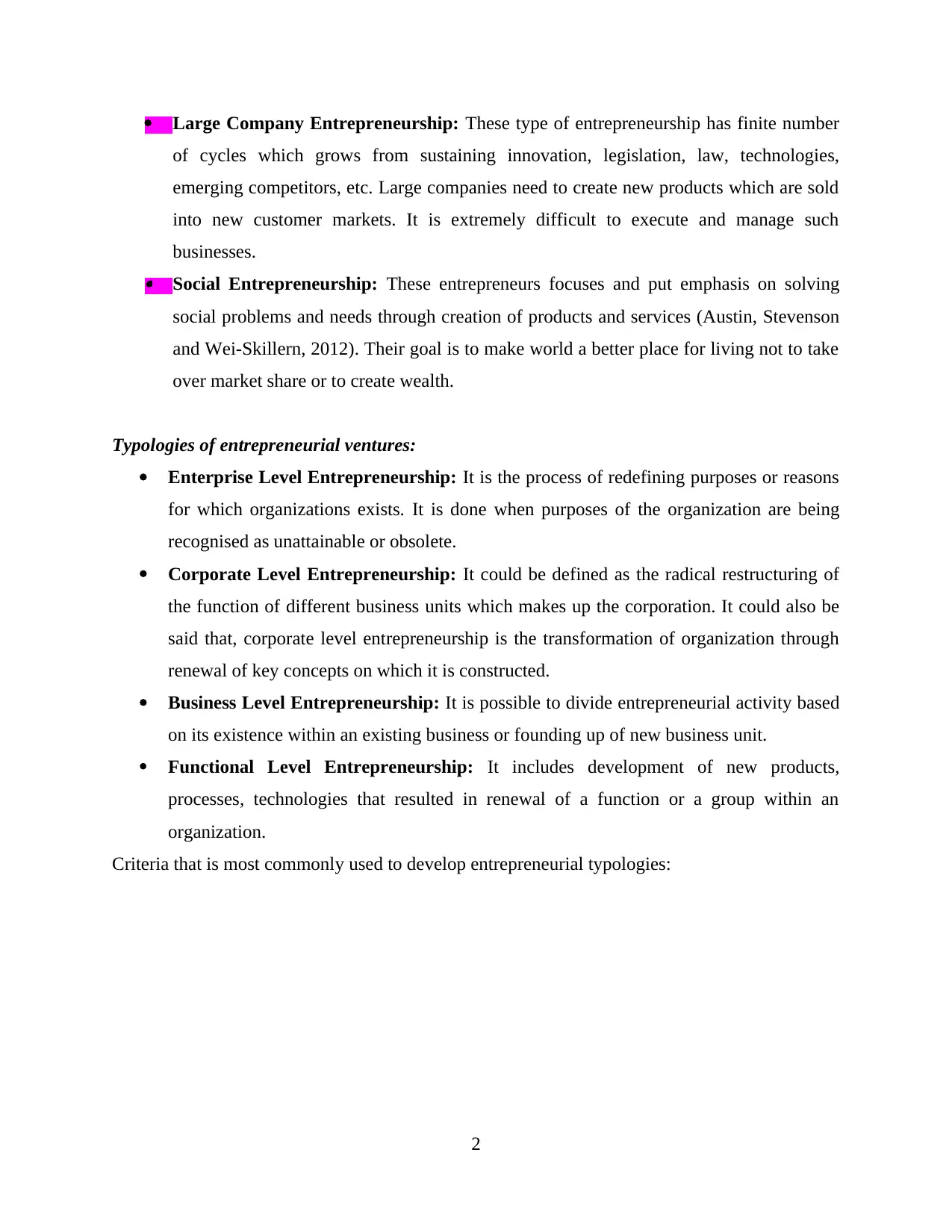
Large Company Entrepreneurship: These type of entrepreneurship has finite number
of cycles which grows from sustaining innovation, legislation, law, technologies,
emerging competitors, etc. Large companies need to create new products which are sold
into new customer markets. It is extremely difficult to execute and manage such
businesses. Social Entrepreneurship: These entrepreneurs focuses and put emphasis on solving
social problems and needs through creation of products and services (Austin, Stevenson
and Wei-Skillern, 2012). Their goal is to make world a better place for living not to take
over market share or to create wealth.
Typologies of entrepreneurial ventures:
Enterprise Level Entrepreneurship: It is the process of redefining purposes or reasons
for which organizations exists. It is done when purposes of the organization are being
recognised as unattainable or obsolete.
Corporate Level Entrepreneurship: It could be defined as the radical restructuring of
the function of different business units which makes up the corporation. It could also be
said that, corporate level entrepreneurship is the transformation of organization through
renewal of key concepts on which it is constructed.
Business Level Entrepreneurship: It is possible to divide entrepreneurial activity based
on its existence within an existing business or founding up of new business unit.
Functional Level Entrepreneurship: It includes development of new products,
processes, technologies that resulted in renewal of a function or a group within an
organization.
Criteria that is most commonly used to develop entrepreneurial typologies:
2
of cycles which grows from sustaining innovation, legislation, law, technologies,
emerging competitors, etc. Large companies need to create new products which are sold
into new customer markets. It is extremely difficult to execute and manage such
businesses. Social Entrepreneurship: These entrepreneurs focuses and put emphasis on solving
social problems and needs through creation of products and services (Austin, Stevenson
and Wei-Skillern, 2012). Their goal is to make world a better place for living not to take
over market share or to create wealth.
Typologies of entrepreneurial ventures:
Enterprise Level Entrepreneurship: It is the process of redefining purposes or reasons
for which organizations exists. It is done when purposes of the organization are being
recognised as unattainable or obsolete.
Corporate Level Entrepreneurship: It could be defined as the radical restructuring of
the function of different business units which makes up the corporation. It could also be
said that, corporate level entrepreneurship is the transformation of organization through
renewal of key concepts on which it is constructed.
Business Level Entrepreneurship: It is possible to divide entrepreneurial activity based
on its existence within an existing business or founding up of new business unit.
Functional Level Entrepreneurship: It includes development of new products,
processes, technologies that resulted in renewal of a function or a group within an
organization.
Criteria that is most commonly used to develop entrepreneurial typologies:
2
Paraphrase This Document
Need a fresh take? Get an instant paraphrase of this document with our AI Paraphraser
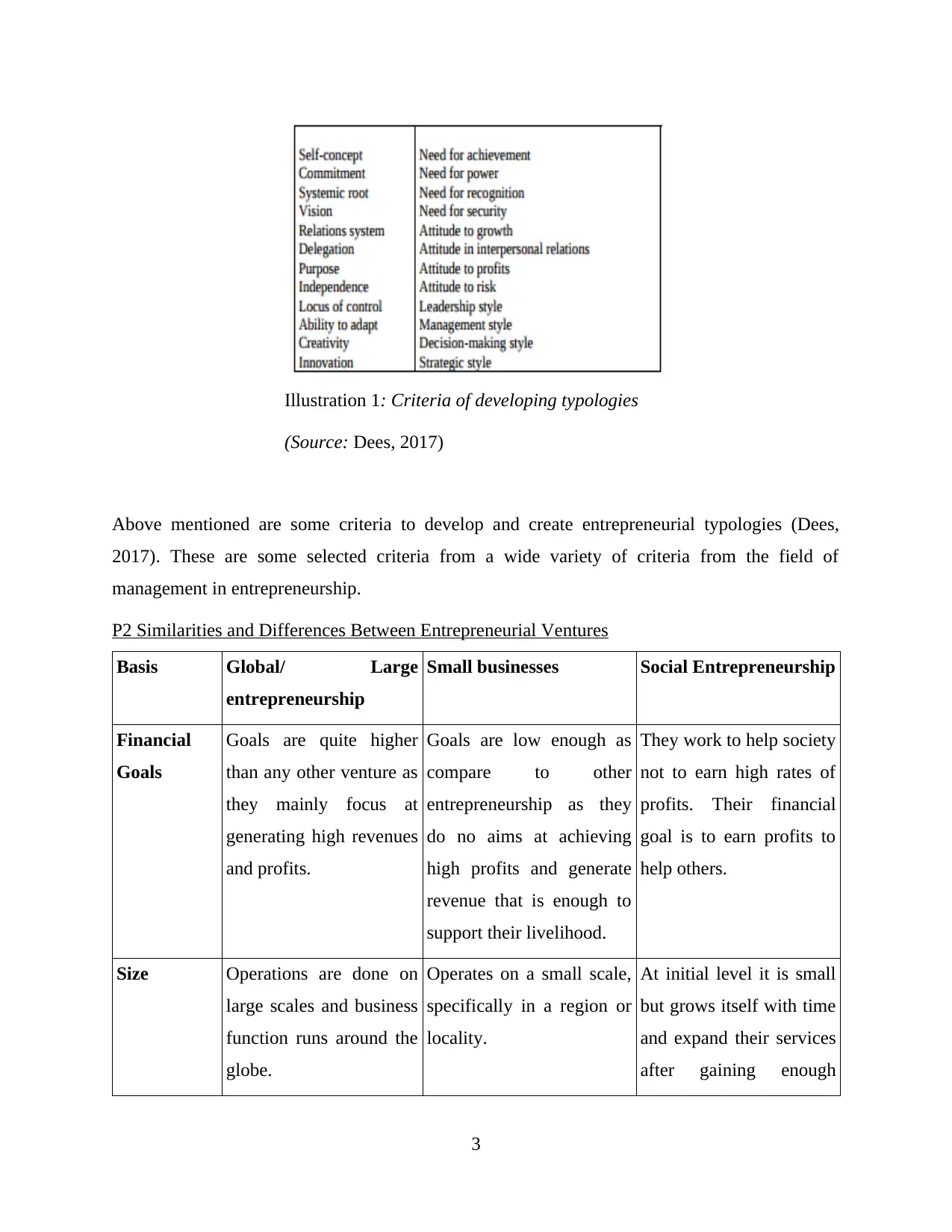
Above mentioned are some criteria to develop and create entrepreneurial typologies (Dees,
2017). These are some selected criteria from a wide variety of criteria from the field of
management in entrepreneurship.
P2 Similarities and Differences Between Entrepreneurial Ventures
Basis Global/ Large
entrepreneurship
Small businesses Social Entrepreneurship
Financial
Goals
Goals are quite higher
than any other venture as
they mainly focus at
generating high revenues
and profits.
Goals are low enough as
compare to other
entrepreneurship as they
do no aims at achieving
high profits and generate
revenue that is enough to
support their livelihood.
They work to help society
not to earn high rates of
profits. Their financial
goal is to earn profits to
help others.
Size Operations are done on
large scales and business
function runs around the
globe.
Operates on a small scale,
specifically in a region or
locality.
At initial level it is small
but grows itself with time
and expand their services
after gaining enough
3
Illustration 1: Criteria of developing typologies
(Source: Dees, 2017)
2017). These are some selected criteria from a wide variety of criteria from the field of
management in entrepreneurship.
P2 Similarities and Differences Between Entrepreneurial Ventures
Basis Global/ Large
entrepreneurship
Small businesses Social Entrepreneurship
Financial
Goals
Goals are quite higher
than any other venture as
they mainly focus at
generating high revenues
and profits.
Goals are low enough as
compare to other
entrepreneurship as they
do no aims at achieving
high profits and generate
revenue that is enough to
support their livelihood.
They work to help society
not to earn high rates of
profits. Their financial
goal is to earn profits to
help others.
Size Operations are done on
large scales and business
function runs around the
globe.
Operates on a small scale,
specifically in a region or
locality.
At initial level it is small
but grows itself with time
and expand their services
after gaining enough
3
Illustration 1: Criteria of developing typologies
(Source: Dees, 2017)
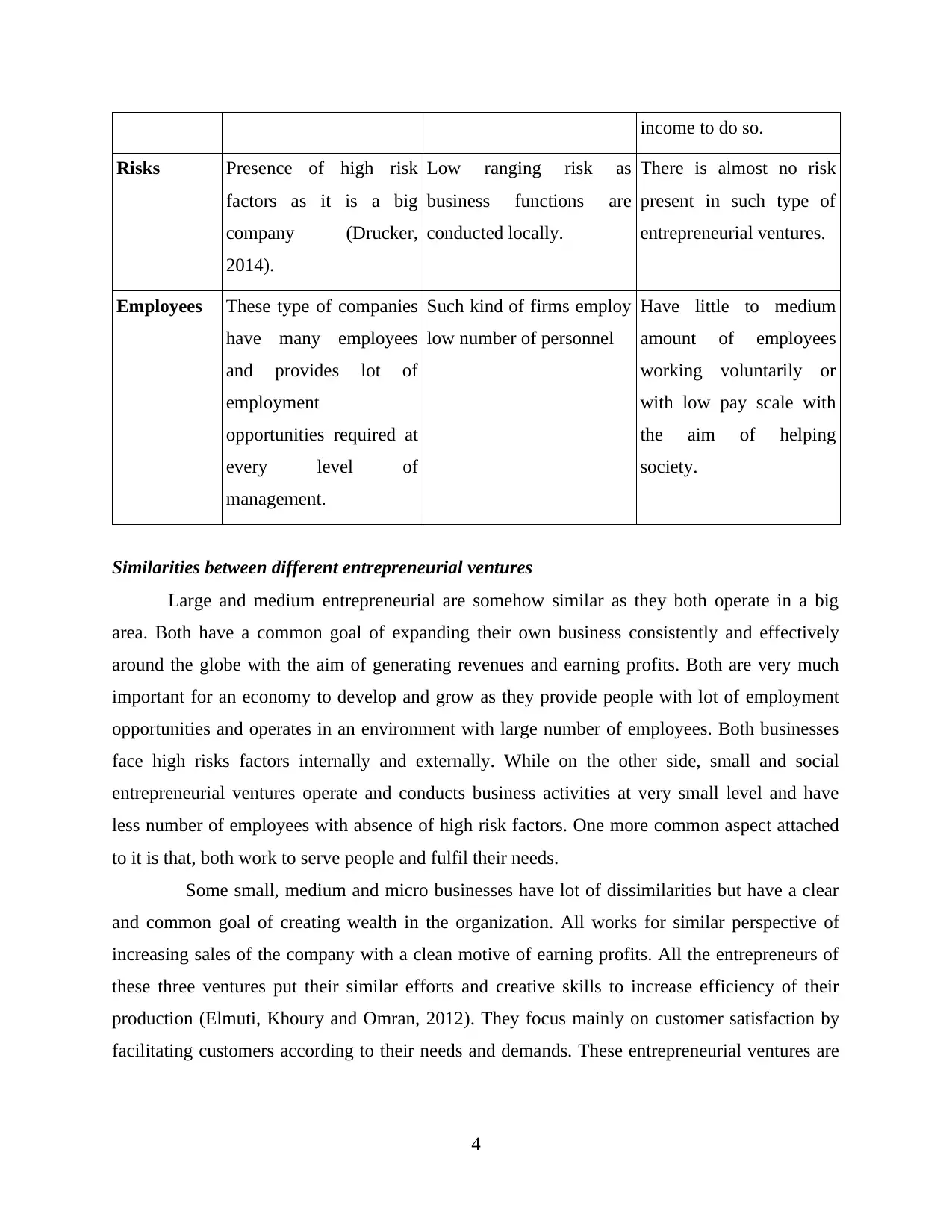
income to do so.
Risks Presence of high risk
factors as it is a big
company (Drucker,
2014).
Low ranging risk as
business functions are
conducted locally.
There is almost no risk
present in such type of
entrepreneurial ventures.
Employees These type of companies
have many employees
and provides lot of
employment
opportunities required at
every level of
management.
Such kind of firms employ
low number of personnel
Have little to medium
amount of employees
working voluntarily or
with low pay scale with
the aim of helping
society.
Similarities between different entrepreneurial ventures
Large and medium entrepreneurial are somehow similar as they both operate in a big
area. Both have a common goal of expanding their own business consistently and effectively
around the globe with the aim of generating revenues and earning profits. Both are very much
important for an economy to develop and grow as they provide people with lot of employment
opportunities and operates in an environment with large number of employees. Both businesses
face high risks factors internally and externally. While on the other side, small and social
entrepreneurial ventures operate and conducts business activities at very small level and have
less number of employees with absence of high risk factors. One more common aspect attached
to it is that, both work to serve people and fulfil their needs.
Some small, medium and micro businesses have lot of dissimilarities but have a clear
and common goal of creating wealth in the organization. All works for similar perspective of
increasing sales of the company with a clean motive of earning profits. All the entrepreneurs of
these three ventures put their similar efforts and creative skills to increase efficiency of their
production (Elmuti, Khoury and Omran, 2012). They focus mainly on customer satisfaction by
facilitating customers according to their needs and demands. These entrepreneurial ventures are
4
Risks Presence of high risk
factors as it is a big
company (Drucker,
2014).
Low ranging risk as
business functions are
conducted locally.
There is almost no risk
present in such type of
entrepreneurial ventures.
Employees These type of companies
have many employees
and provides lot of
employment
opportunities required at
every level of
management.
Such kind of firms employ
low number of personnel
Have little to medium
amount of employees
working voluntarily or
with low pay scale with
the aim of helping
society.
Similarities between different entrepreneurial ventures
Large and medium entrepreneurial are somehow similar as they both operate in a big
area. Both have a common goal of expanding their own business consistently and effectively
around the globe with the aim of generating revenues and earning profits. Both are very much
important for an economy to develop and grow as they provide people with lot of employment
opportunities and operates in an environment with large number of employees. Both businesses
face high risks factors internally and externally. While on the other side, small and social
entrepreneurial ventures operate and conducts business activities at very small level and have
less number of employees with absence of high risk factors. One more common aspect attached
to it is that, both work to serve people and fulfil their needs.
Some small, medium and micro businesses have lot of dissimilarities but have a clear
and common goal of creating wealth in the organization. All works for similar perspective of
increasing sales of the company with a clean motive of earning profits. All the entrepreneurs of
these three ventures put their similar efforts and creative skills to increase efficiency of their
production (Elmuti, Khoury and Omran, 2012). They focus mainly on customer satisfaction by
facilitating customers according to their needs and demands. These entrepreneurial ventures are
4
⊘ This is a preview!⊘
Do you want full access?
Subscribe today to unlock all pages.

Trusted by 1+ million students worldwide
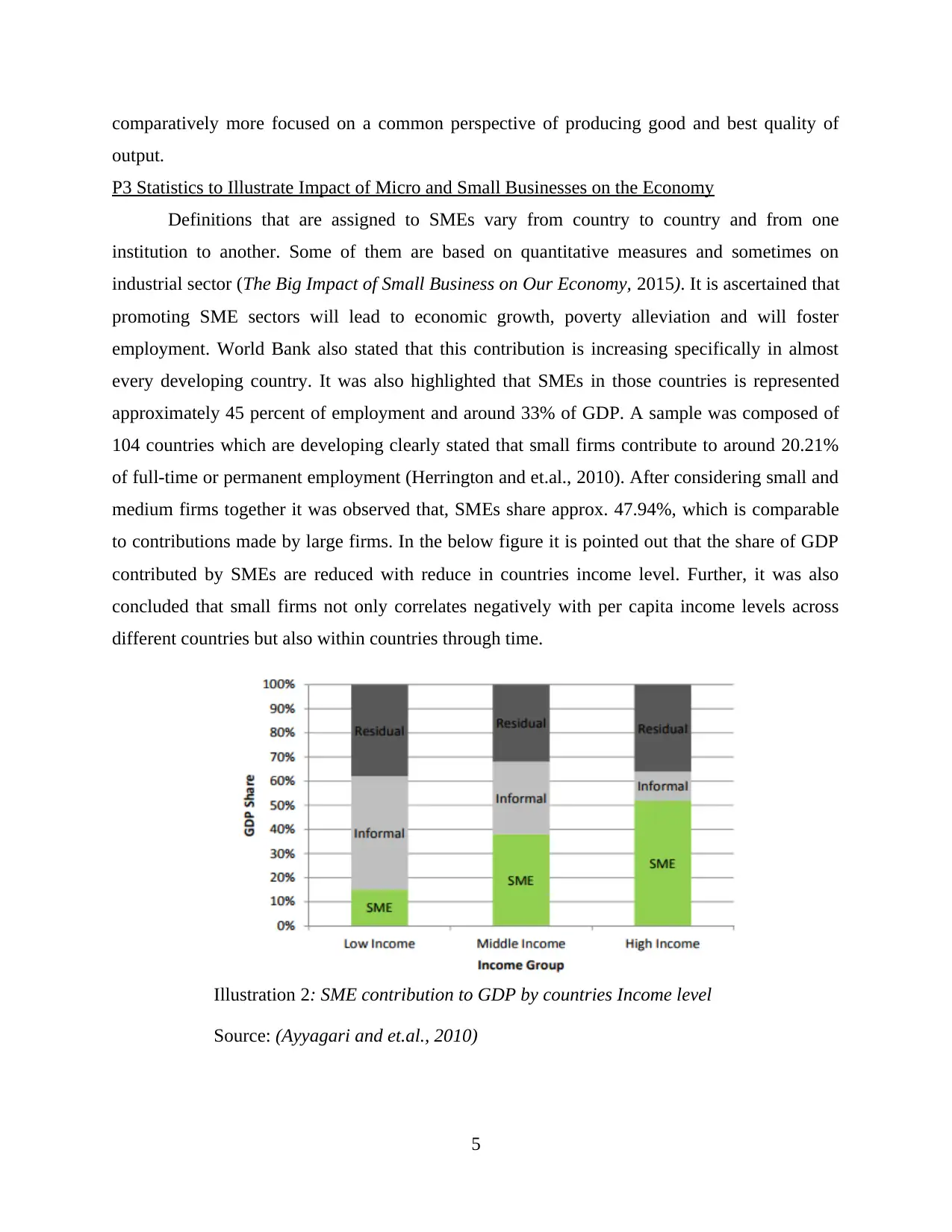
comparatively more focused on a common perspective of producing good and best quality of
output.
P3 Statistics to Illustrate Impact of Micro and Small Businesses on the Economy
Definitions that are assigned to SMEs vary from country to country and from one
institution to another. Some of them are based on quantitative measures and sometimes on
industrial sector (The Big Impact of Small Business on Our Economy, 2015). It is ascertained that
promoting SME sectors will lead to economic growth, poverty alleviation and will foster
employment. World Bank also stated that this contribution is increasing specifically in almost
every developing country. It was also highlighted that SMEs in those countries is represented
approximately 45 percent of employment and around 33% of GDP. A sample was composed of
104 countries which are developing clearly stated that small firms contribute to around 20.21%
of full-time or permanent employment (Herrington and et.al., 2010). After considering small and
medium firms together it was observed that, SMEs share approx. 47.94%, which is comparable
to contributions made by large firms. In the below figure it is pointed out that the share of GDP
contributed by SMEs are reduced with reduce in countries income level. Further, it was also
concluded that small firms not only correlates negatively with per capita income levels across
different countries but also within countries through time.
5
Illustration 2: SME contribution to GDP by countries Income level
Source: (Ayyagari and et.al., 2010)
output.
P3 Statistics to Illustrate Impact of Micro and Small Businesses on the Economy
Definitions that are assigned to SMEs vary from country to country and from one
institution to another. Some of them are based on quantitative measures and sometimes on
industrial sector (The Big Impact of Small Business on Our Economy, 2015). It is ascertained that
promoting SME sectors will lead to economic growth, poverty alleviation and will foster
employment. World Bank also stated that this contribution is increasing specifically in almost
every developing country. It was also highlighted that SMEs in those countries is represented
approximately 45 percent of employment and around 33% of GDP. A sample was composed of
104 countries which are developing clearly stated that small firms contribute to around 20.21%
of full-time or permanent employment (Herrington and et.al., 2010). After considering small and
medium firms together it was observed that, SMEs share approx. 47.94%, which is comparable
to contributions made by large firms. In the below figure it is pointed out that the share of GDP
contributed by SMEs are reduced with reduce in countries income level. Further, it was also
concluded that small firms not only correlates negatively with per capita income levels across
different countries but also within countries through time.
5
Illustration 2: SME contribution to GDP by countries Income level
Source: (Ayyagari and et.al., 2010)
Paraphrase This Document
Need a fresh take? Get an instant paraphrase of this document with our AI Paraphraser
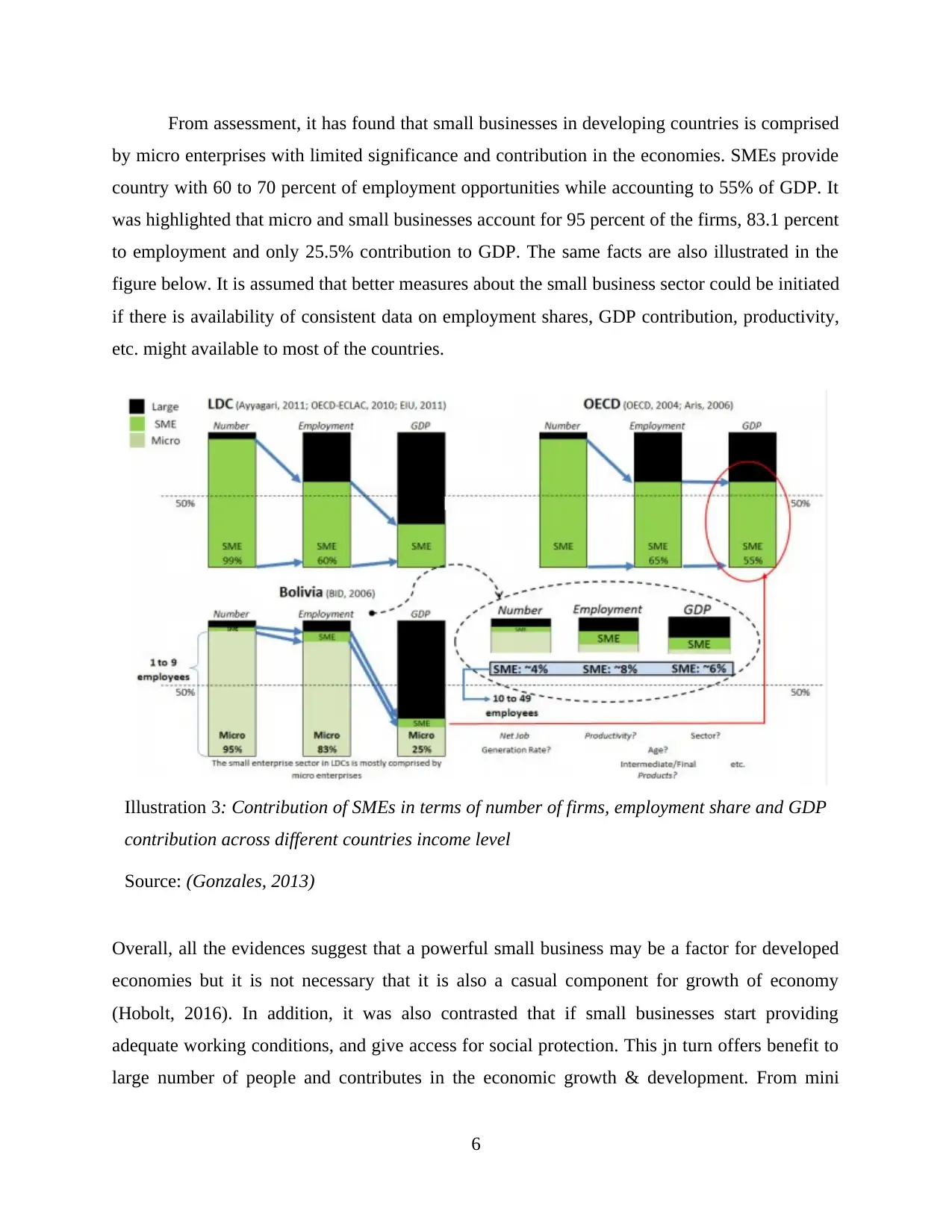
From assessment, it has found that small businesses in developing countries is comprised
by micro enterprises with limited significance and contribution in the economies. SMEs provide
country with 60 to 70 percent of employment opportunities while accounting to 55% of GDP. It
was highlighted that micro and small businesses account for 95 percent of the firms, 83.1 percent
to employment and only 25.5% contribution to GDP. The same facts are also illustrated in the
figure below. It is assumed that better measures about the small business sector could be initiated
if there is availability of consistent data on employment shares, GDP contribution, productivity,
etc. might available to most of the countries.
Overall, all the evidences suggest that a powerful small business may be a factor for developed
economies but it is not necessary that it is also a casual component for growth of economy
(Hobolt, 2016). In addition, it was also contrasted that if small businesses start providing
adequate working conditions, and give access for social protection. This jn turn offers benefit to
large number of people and contributes in the economic growth & development. From mini
6
Illustration 3: Contribution of SMEs in terms of number of firms, employment share and GDP
contribution across different countries income level
Source: (Gonzales, 2013)
by micro enterprises with limited significance and contribution in the economies. SMEs provide
country with 60 to 70 percent of employment opportunities while accounting to 55% of GDP. It
was highlighted that micro and small businesses account for 95 percent of the firms, 83.1 percent
to employment and only 25.5% contribution to GDP. The same facts are also illustrated in the
figure below. It is assumed that better measures about the small business sector could be initiated
if there is availability of consistent data on employment shares, GDP contribution, productivity,
etc. might available to most of the countries.
Overall, all the evidences suggest that a powerful small business may be a factor for developed
economies but it is not necessary that it is also a casual component for growth of economy
(Hobolt, 2016). In addition, it was also contrasted that if small businesses start providing
adequate working conditions, and give access for social protection. This jn turn offers benefit to
large number of people and contributes in the economic growth & development. From mini
6
Illustration 3: Contribution of SMEs in terms of number of firms, employment share and GDP
contribution across different countries income level
Source: (Gonzales, 2013)
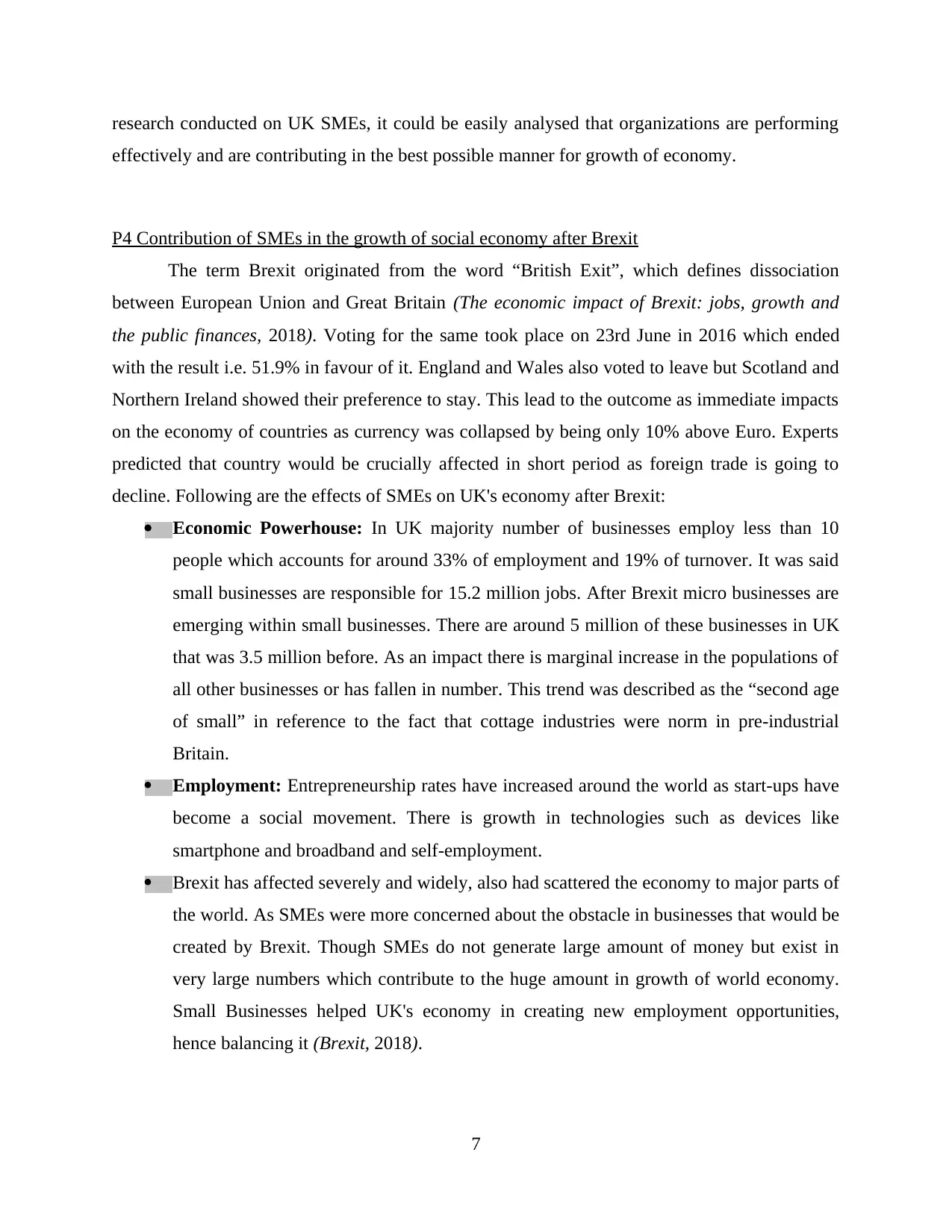
research conducted on UK SMEs, it could be easily analysed that organizations are performing
effectively and are contributing in the best possible manner for growth of economy.
P4 Contribution of SMEs in the growth of social economy after Brexit
The term Brexit originated from the word “British Exit”, which defines dissociation
between European Union and Great Britain (The economic impact of Brexit: jobs, growth and
the public finances, 2018). Voting for the same took place on 23rd June in 2016 which ended
with the result i.e. 51.9% in favour of it. England and Wales also voted to leave but Scotland and
Northern Ireland showed their preference to stay. This lead to the outcome as immediate impacts
on the economy of countries as currency was collapsed by being only 10% above Euro. Experts
predicted that country would be crucially affected in short period as foreign trade is going to
decline. Following are the effects of SMEs on UK's economy after Brexit:
Economic Powerhouse: In UK majority number of businesses employ less than 10
people which accounts for around 33% of employment and 19% of turnover. It was said
small businesses are responsible for 15.2 million jobs. After Brexit micro businesses are
emerging within small businesses. There are around 5 million of these businesses in UK
that was 3.5 million before. As an impact there is marginal increase in the populations of
all other businesses or has fallen in number. This trend was described as the “second age
of small” in reference to the fact that cottage industries were norm in pre-industrial
Britain.
Employment: Entrepreneurship rates have increased around the world as start-ups have
become a social movement. There is growth in technologies such as devices like
smartphone and broadband and self-employment.
Brexit has affected severely and widely, also had scattered the economy to major parts of
the world. As SMEs were more concerned about the obstacle in businesses that would be
created by Brexit. Though SMEs do not generate large amount of money but exist in
very large numbers which contribute to the huge amount in growth of world economy.
Small Businesses helped UK's economy in creating new employment opportunities,
hence balancing it (Brexit, 2018).
7
effectively and are contributing in the best possible manner for growth of economy.
P4 Contribution of SMEs in the growth of social economy after Brexit
The term Brexit originated from the word “British Exit”, which defines dissociation
between European Union and Great Britain (The economic impact of Brexit: jobs, growth and
the public finances, 2018). Voting for the same took place on 23rd June in 2016 which ended
with the result i.e. 51.9% in favour of it. England and Wales also voted to leave but Scotland and
Northern Ireland showed their preference to stay. This lead to the outcome as immediate impacts
on the economy of countries as currency was collapsed by being only 10% above Euro. Experts
predicted that country would be crucially affected in short period as foreign trade is going to
decline. Following are the effects of SMEs on UK's economy after Brexit:
Economic Powerhouse: In UK majority number of businesses employ less than 10
people which accounts for around 33% of employment and 19% of turnover. It was said
small businesses are responsible for 15.2 million jobs. After Brexit micro businesses are
emerging within small businesses. There are around 5 million of these businesses in UK
that was 3.5 million before. As an impact there is marginal increase in the populations of
all other businesses or has fallen in number. This trend was described as the “second age
of small” in reference to the fact that cottage industries were norm in pre-industrial
Britain.
Employment: Entrepreneurship rates have increased around the world as start-ups have
become a social movement. There is growth in technologies such as devices like
smartphone and broadband and self-employment.
Brexit has affected severely and widely, also had scattered the economy to major parts of
the world. As SMEs were more concerned about the obstacle in businesses that would be
created by Brexit. Though SMEs do not generate large amount of money but exist in
very large numbers which contribute to the huge amount in growth of world economy.
Small Businesses helped UK's economy in creating new employment opportunities,
hence balancing it (Brexit, 2018).
7
⊘ This is a preview!⊘
Do you want full access?
Subscribe today to unlock all pages.

Trusted by 1+ million students worldwide
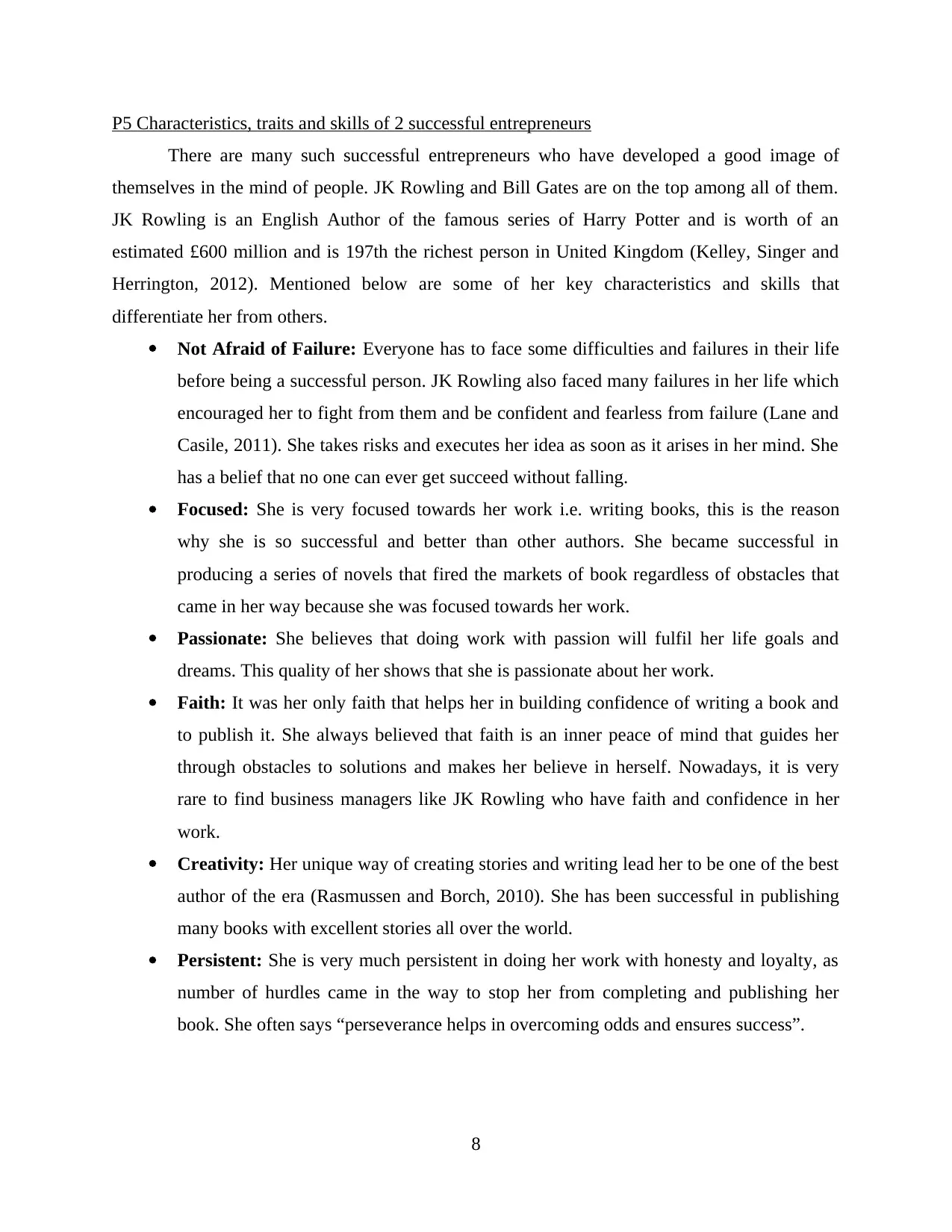
P5 Characteristics, traits and skills of 2 successful entrepreneurs
There are many such successful entrepreneurs who have developed a good image of
themselves in the mind of people. JK Rowling and Bill Gates are on the top among all of them.
JK Rowling is an English Author of the famous series of Harry Potter and is worth of an
estimated £600 million and is 197th the richest person in United Kingdom (Kelley, Singer and
Herrington, 2012). Mentioned below are some of her key characteristics and skills that
differentiate her from others.
Not Afraid of Failure: Everyone has to face some difficulties and failures in their life
before being a successful person. JK Rowling also faced many failures in her life which
encouraged her to fight from them and be confident and fearless from failure (Lane and
Casile, 2011). She takes risks and executes her idea as soon as it arises in her mind. She
has a belief that no one can ever get succeed without falling.
Focused: She is very focused towards her work i.e. writing books, this is the reason
why she is so successful and better than other authors. She became successful in
producing a series of novels that fired the markets of book regardless of obstacles that
came in her way because she was focused towards her work.
Passionate: She believes that doing work with passion will fulfil her life goals and
dreams. This quality of her shows that she is passionate about her work.
Faith: It was her only faith that helps her in building confidence of writing a book and
to publish it. She always believed that faith is an inner peace of mind that guides her
through obstacles to solutions and makes her believe in herself. Nowadays, it is very
rare to find business managers like JK Rowling who have faith and confidence in her
work.
Creativity: Her unique way of creating stories and writing lead her to be one of the best
author of the era (Rasmussen and Borch, 2010). She has been successful in publishing
many books with excellent stories all over the world.
Persistent: She is very much persistent in doing her work with honesty and loyalty, as
number of hurdles came in the way to stop her from completing and publishing her
book. She often says “perseverance helps in overcoming odds and ensures success”.
8
There are many such successful entrepreneurs who have developed a good image of
themselves in the mind of people. JK Rowling and Bill Gates are on the top among all of them.
JK Rowling is an English Author of the famous series of Harry Potter and is worth of an
estimated £600 million and is 197th the richest person in United Kingdom (Kelley, Singer and
Herrington, 2012). Mentioned below are some of her key characteristics and skills that
differentiate her from others.
Not Afraid of Failure: Everyone has to face some difficulties and failures in their life
before being a successful person. JK Rowling also faced many failures in her life which
encouraged her to fight from them and be confident and fearless from failure (Lane and
Casile, 2011). She takes risks and executes her idea as soon as it arises in her mind. She
has a belief that no one can ever get succeed without falling.
Focused: She is very focused towards her work i.e. writing books, this is the reason
why she is so successful and better than other authors. She became successful in
producing a series of novels that fired the markets of book regardless of obstacles that
came in her way because she was focused towards her work.
Passionate: She believes that doing work with passion will fulfil her life goals and
dreams. This quality of her shows that she is passionate about her work.
Faith: It was her only faith that helps her in building confidence of writing a book and
to publish it. She always believed that faith is an inner peace of mind that guides her
through obstacles to solutions and makes her believe in herself. Nowadays, it is very
rare to find business managers like JK Rowling who have faith and confidence in her
work.
Creativity: Her unique way of creating stories and writing lead her to be one of the best
author of the era (Rasmussen and Borch, 2010). She has been successful in publishing
many books with excellent stories all over the world.
Persistent: She is very much persistent in doing her work with honesty and loyalty, as
number of hurdles came in the way to stop her from completing and publishing her
book. She often says “perseverance helps in overcoming odds and ensures success”.
8
Paraphrase This Document
Need a fresh take? Get an instant paraphrase of this document with our AI Paraphraser
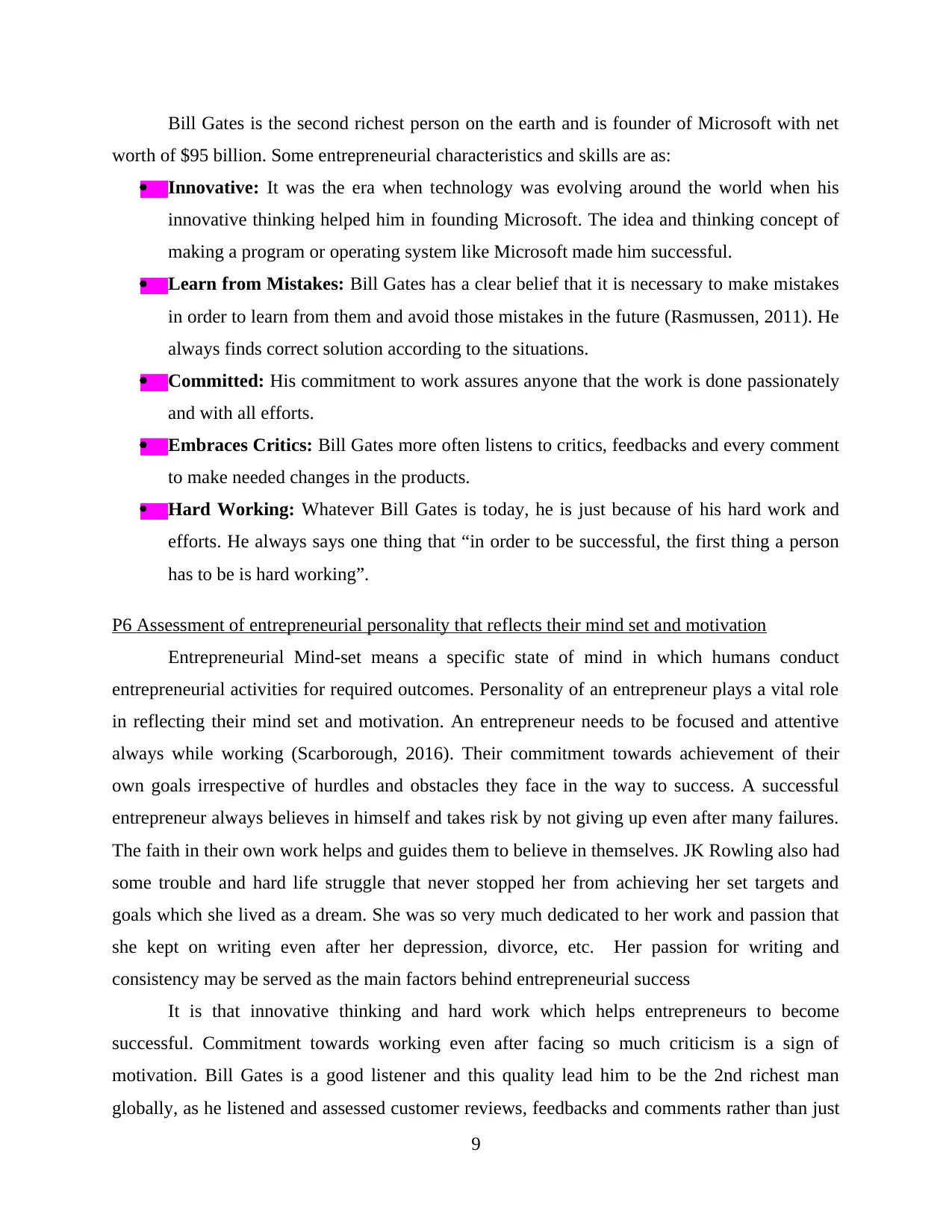
Bill Gates is the second richest person on the earth and is founder of Microsoft with net
worth of $95 billion. Some entrepreneurial characteristics and skills are as:
Innovative: It was the era when technology was evolving around the world when his
innovative thinking helped him in founding Microsoft. The idea and thinking concept of
making a program or operating system like Microsoft made him successful.
Learn from Mistakes: Bill Gates has a clear belief that it is necessary to make mistakes
in order to learn from them and avoid those mistakes in the future (Rasmussen, 2011). He
always finds correct solution according to the situations.
Committed: His commitment to work assures anyone that the work is done passionately
and with all efforts.
Embraces Critics: Bill Gates more often listens to critics, feedbacks and every comment
to make needed changes in the products.
Hard Working: Whatever Bill Gates is today, he is just because of his hard work and
efforts. He always says one thing that “in order to be successful, the first thing a person
has to be is hard working”.
P6 Assessment of entrepreneurial personality that reflects their mind set and motivation
Entrepreneurial Mind-set means a specific state of mind in which humans conduct
entrepreneurial activities for required outcomes. Personality of an entrepreneur plays a vital role
in reflecting their mind set and motivation. An entrepreneur needs to be focused and attentive
always while working (Scarborough, 2016). Their commitment towards achievement of their
own goals irrespective of hurdles and obstacles they face in the way to success. A successful
entrepreneur always believes in himself and takes risk by not giving up even after many failures.
The faith in their own work helps and guides them to believe in themselves. JK Rowling also had
some trouble and hard life struggle that never stopped her from achieving her set targets and
goals which she lived as a dream. She was so very much dedicated to her work and passion that
she kept on writing even after her depression, divorce, etc. Her passion for writing and
consistency may be served as the main factors behind entrepreneurial success
It is that innovative thinking and hard work which helps entrepreneurs to become
successful. Commitment towards working even after facing so much criticism is a sign of
motivation. Bill Gates is a good listener and this quality lead him to be the 2nd richest man
globally, as he listened and assessed customer reviews, feedbacks and comments rather than just
9
worth of $95 billion. Some entrepreneurial characteristics and skills are as:
Innovative: It was the era when technology was evolving around the world when his
innovative thinking helped him in founding Microsoft. The idea and thinking concept of
making a program or operating system like Microsoft made him successful.
Learn from Mistakes: Bill Gates has a clear belief that it is necessary to make mistakes
in order to learn from them and avoid those mistakes in the future (Rasmussen, 2011). He
always finds correct solution according to the situations.
Committed: His commitment to work assures anyone that the work is done passionately
and with all efforts.
Embraces Critics: Bill Gates more often listens to critics, feedbacks and every comment
to make needed changes in the products.
Hard Working: Whatever Bill Gates is today, he is just because of his hard work and
efforts. He always says one thing that “in order to be successful, the first thing a person
has to be is hard working”.
P6 Assessment of entrepreneurial personality that reflects their mind set and motivation
Entrepreneurial Mind-set means a specific state of mind in which humans conduct
entrepreneurial activities for required outcomes. Personality of an entrepreneur plays a vital role
in reflecting their mind set and motivation. An entrepreneur needs to be focused and attentive
always while working (Scarborough, 2016). Their commitment towards achievement of their
own goals irrespective of hurdles and obstacles they face in the way to success. A successful
entrepreneur always believes in himself and takes risk by not giving up even after many failures.
The faith in their own work helps and guides them to believe in themselves. JK Rowling also had
some trouble and hard life struggle that never stopped her from achieving her set targets and
goals which she lived as a dream. She was so very much dedicated to her work and passion that
she kept on writing even after her depression, divorce, etc. Her passion for writing and
consistency may be served as the main factors behind entrepreneurial success
It is that innovative thinking and hard work which helps entrepreneurs to become
successful. Commitment towards working even after facing so much criticism is a sign of
motivation. Bill Gates is a good listener and this quality lead him to be the 2nd richest man
globally, as he listened and assessed customer reviews, feedbacks and comments rather than just
9
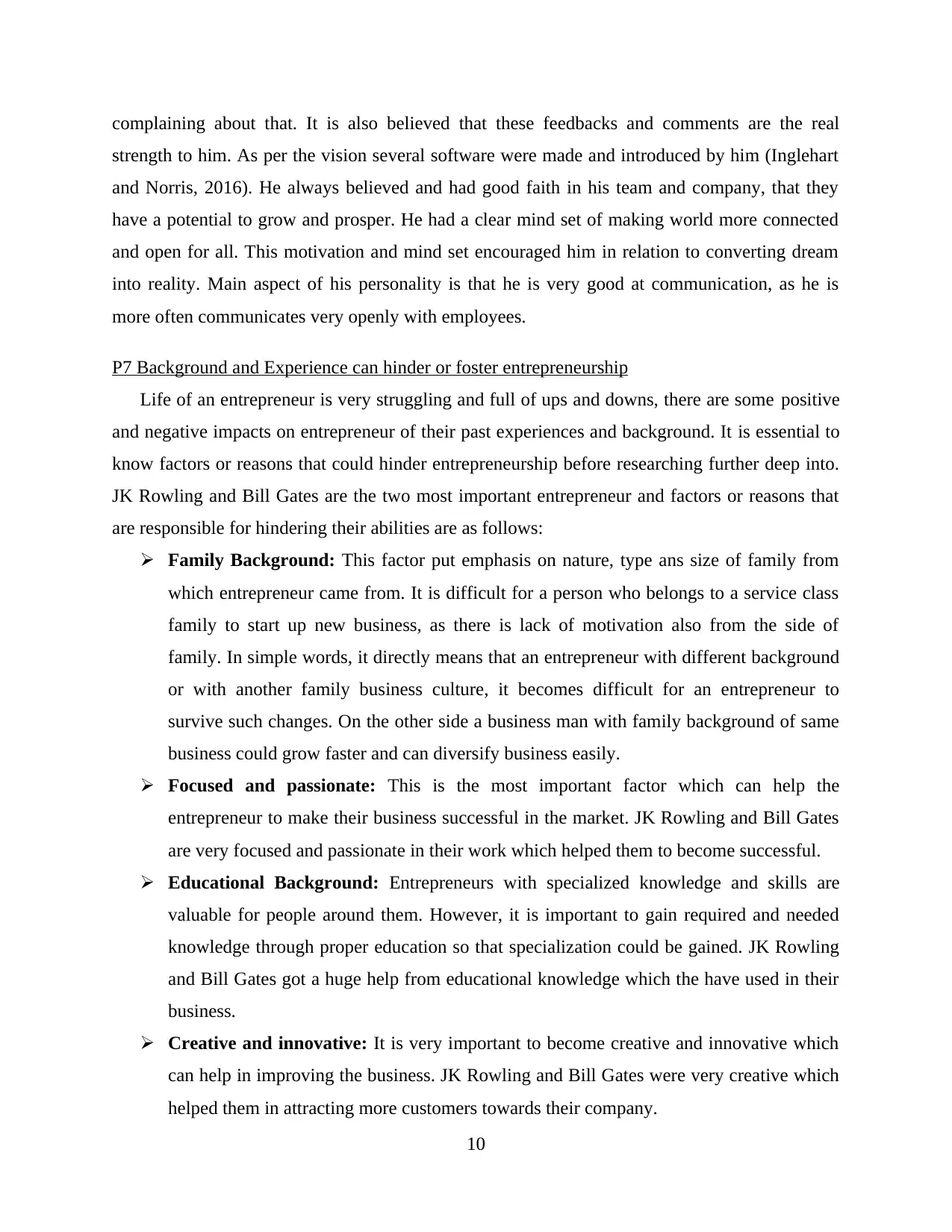
complaining about that. It is also believed that these feedbacks and comments are the real
strength to him. As per the vision several software were made and introduced by him (Inglehart
and Norris, 2016). He always believed and had good faith in his team and company, that they
have a potential to grow and prosper. He had a clear mind set of making world more connected
and open for all. This motivation and mind set encouraged him in relation to converting dream
into reality. Main aspect of his personality is that he is very good at communication, as he is
more often communicates very openly with employees.
P7 Background and Experience can hinder or foster entrepreneurship
Life of an entrepreneur is very struggling and full of ups and downs, there are some positive
and negative impacts on entrepreneur of their past experiences and background. It is essential to
know factors or reasons that could hinder entrepreneurship before researching further deep into.
JK Rowling and Bill Gates are the two most important entrepreneur and factors or reasons that
are responsible for hindering their abilities are as follows:
Family Background: This factor put emphasis on nature, type ans size of family from
which entrepreneur came from. It is difficult for a person who belongs to a service class
family to start up new business, as there is lack of motivation also from the side of
family. In simple words, it directly means that an entrepreneur with different background
or with another family business culture, it becomes difficult for an entrepreneur to
survive such changes. On the other side a business man with family background of same
business could grow faster and can diversify business easily.
Focused and passionate: This is the most important factor which can help the
entrepreneur to make their business successful in the market. JK Rowling and Bill Gates
are very focused and passionate in their work which helped them to become successful.
Educational Background: Entrepreneurs with specialized knowledge and skills are
valuable for people around them. However, it is important to gain required and needed
knowledge through proper education so that specialization could be gained. JK Rowling
and Bill Gates got a huge help from educational knowledge which the have used in their
business.
Creative and innovative: It is very important to become creative and innovative which
can help in improving the business. JK Rowling and Bill Gates were very creative which
helped them in attracting more customers towards their company.
10
strength to him. As per the vision several software were made and introduced by him (Inglehart
and Norris, 2016). He always believed and had good faith in his team and company, that they
have a potential to grow and prosper. He had a clear mind set of making world more connected
and open for all. This motivation and mind set encouraged him in relation to converting dream
into reality. Main aspect of his personality is that he is very good at communication, as he is
more often communicates very openly with employees.
P7 Background and Experience can hinder or foster entrepreneurship
Life of an entrepreneur is very struggling and full of ups and downs, there are some positive
and negative impacts on entrepreneur of their past experiences and background. It is essential to
know factors or reasons that could hinder entrepreneurship before researching further deep into.
JK Rowling and Bill Gates are the two most important entrepreneur and factors or reasons that
are responsible for hindering their abilities are as follows:
Family Background: This factor put emphasis on nature, type ans size of family from
which entrepreneur came from. It is difficult for a person who belongs to a service class
family to start up new business, as there is lack of motivation also from the side of
family. In simple words, it directly means that an entrepreneur with different background
or with another family business culture, it becomes difficult for an entrepreneur to
survive such changes. On the other side a business man with family background of same
business could grow faster and can diversify business easily.
Focused and passionate: This is the most important factor which can help the
entrepreneur to make their business successful in the market. JK Rowling and Bill Gates
are very focused and passionate in their work which helped them to become successful.
Educational Background: Entrepreneurs with specialized knowledge and skills are
valuable for people around them. However, it is important to gain required and needed
knowledge through proper education so that specialization could be gained. JK Rowling
and Bill Gates got a huge help from educational knowledge which the have used in their
business.
Creative and innovative: It is very important to become creative and innovative which
can help in improving the business. JK Rowling and Bill Gates were very creative which
helped them in attracting more customers towards their company.
10
⊘ This is a preview!⊘
Do you want full access?
Subscribe today to unlock all pages.

Trusted by 1+ million students worldwide
1 out of 15
Related Documents
Your All-in-One AI-Powered Toolkit for Academic Success.
+13062052269
info@desklib.com
Available 24*7 on WhatsApp / Email
![[object Object]](/_next/static/media/star-bottom.7253800d.svg)
Unlock your academic potential
Copyright © 2020–2026 A2Z Services. All Rights Reserved. Developed and managed by ZUCOL.





